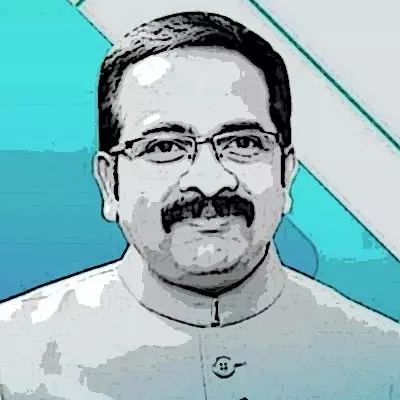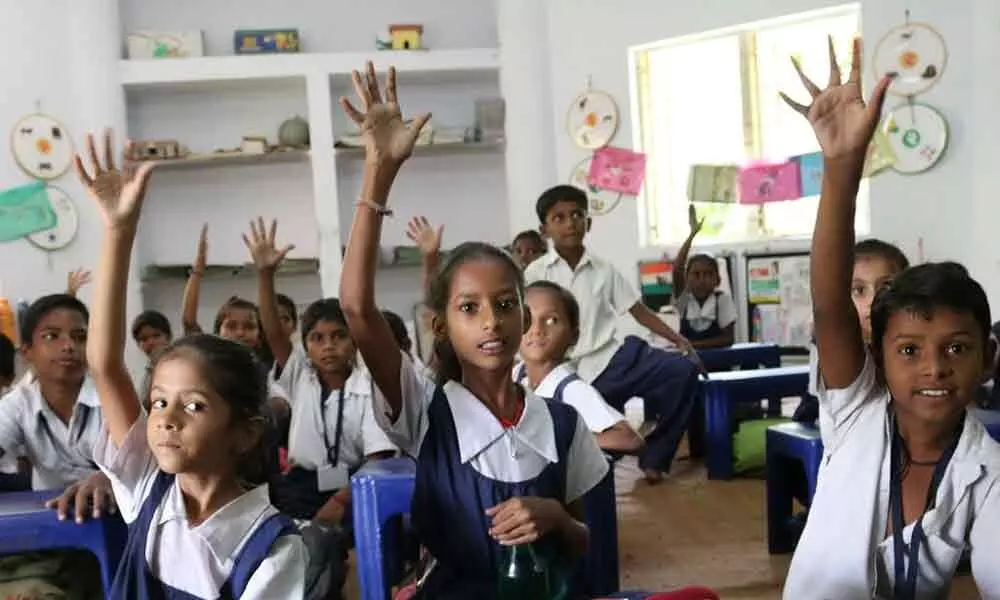Live
- Three persons admitted to hospital for diarrhea treatment
- First Star Outside Milky Way Captured: WOH G64 is 2,000 Times Larger Than the Sun
- Sikkim govt to constitute state Niti Ayog: CM Tamang
- CBI books Rajasthan narcotics inspector for Rs 3 lakh bribe
- Rajasthan bypolls: A tough contest between BJP and Congress
- Albania joins SEPA, paving way for EU integration
- Japanese government approves 250-billion USD economic package to ease price pain
- Six pharma companies to set up their units in Telangana
- The Unstable Events of a 17-Wicket Day in Perth: India vs Australia
- Dutch FM's Israel trip cancelled after Netanyahu's arrest warrant
Just In
PM Modi & a historic education reform


Representational Pic
In contemporary times we live in, it is the education which directly impacts the socio-economic position of an individual, a society and a nation. Nations which have not prioritised education have lost out on massive economic opportunities and ended up in painful social unrest and economic suffering
The New Education Policy provides portability of curricular credits throughout the higher education timeline, which empowers students with enormous choice of subject combinations, and ease of moving in and out of educational phases for prioritising their personal and professional needs. Allowing inter-disciplinary shifts through the higher education timeline of a student, also allows back tracking on individual subject priorities or making progressive changes to one's education profile, as they go up the higher education ladder. It also allows students to choose multiple specializations from subjects of their choice even at the top of their educational pursuit like a Ph D programme
In contemporary times we live in, it is the education which directly impacts the socio-economic position of an individual, a society and a nation. Nations which have not prioritised education have lost out on massive economic opportunities and ended up in painful social unrest and economic suffering. India, being the second most populated nation cannot afford to make the mistake of underprioritising education.
Prime Minister Narendra Modi with his vision for 'New India' has unveiled a 'New Education Policy' and this is an essential reform which was long due. For over 70 years, India has been making only peripheral changes in its educational system without having to envision the need for massive overhaul. Leadership of a nation is about guiding it towards glory, through empowerment of its citizens. A nation with a literacy rate of 74%, certainly requires pushing forward a larger agenda of 100% literacy in the near term. 100% education should be the next national agenda for a decade or two.
Education is the most economically efficient empowerment initiative for a nation. Every other form of social empowerment requires large fund availability. It also entails possibility of wastage, leakage and above all no guaranteed results.
The New Education Policy has clearly highlighted the priorities of this government. PM Modi has delivered an essential reform which BJP was demanding every government for over six decades. BJP strongly believes, it's the education which shapes the national values, protects spirit of nationalism and enables nation building. Education singularly impacts socio-economic activity of a nation through rise in employment and productivity.
These are some of the key drivers of the New Education Policy:
Single Regulator
Multiple regulatory agencies have succeeded in lowering the education standards for decades with regulatory overlaps, policy paralysis, execution delays, corruption and lack of enterprise spirit.
Single regulator will bring much needed breather for educational institutions to operate with more agility, free from regulatory hassles and project delays. It will also enable market orientation to the entire education system, instead of an oppressive regime breathing heavy over administration of institutions.
Medium Of Instruction
There has been a lot of confusion and debate over what is an effective medium of instruction in India? for decades. With half-baked understanding of India's demography, geography, history and cultural heritage, this debate led by Communists with the help of Congress has led Indian education system to disrespect and disown Indian languages and promote of English as a core medium of instruction.
The enslaved colonial mindset, disguised as elitists and pragmatists have succeeded so far, driving the narrative of 'Employability' as the reason for English medium instruction for all. Some states in India have even adopted this mindless and prejudiced advocacy. India is a multi-lingual, multi-regional and multi-cultural heterogenous nation. The 22 recognized languages of India represent the respective region's cultural heritage, dating back to centuries. A language is a strong enabler of self-worth, belongingness, regional identity and impacts regional pride. Directing the medium of instruction to be of the regional language or mother tongue until 5th standard in school education is a path breaking reform, which protects the national heritage and culture.
Inter-Disciplinary Enabler
The New Education Policy provides portability of curricular credits throughout the higher education timeline, which empowers students with enormous choice of subject combinations, and ease of moving in and out of educational phases for prioritizing their personal and professional needs.
Allowing inter-disciplinary shifts through the higher education timeline of a student, also allows back tracking on individual subject priorities or making progressive changes to one's education profile, as they go up the higher education ladder. It also allows students to choose multiple specializations from subjects of their choice even at the top of their educational pursuit like a PHD programme.
New Grading System
Moving away from memorised learning and ranking through academic marks, the new education policy drives a powerful change through a grading system, which evaluates and grades students through a full spectrum of curricular and non-curricular competencies, knowledge and skills.
This reform is a life saver for many young people, as it reduces the unfair advantage few students hold over many, with just memory capability and not necessarily a knowledge edge. The new system also encourages students to get out of their academic silos and acquire more social and vocational skills right from their school education timeline.
Vocational Skill Focus
While education must enable knowledge, it should also ensure employment. Education without employment will be an overrated and resource pilfered exercise, especially in a nation of 1.3 billion, where over 12% live in poverty. PM Modi and his government has initiated 'Make in India' agenda to transform India into a self-reliant nation, which can produce what it consumes, and not depend on imports for its domestic consumption of goods and services. However, without an educated, skilled manpower availability, 'Make in India' initiative cannot be fueled to fulfil this grand national ambition.
Prioritising vocational skills from the school education timeline, enables the focus on learning 'skills to-earn-a-living', and ensures millions of economically and socially backward communities to be empowered in a generation or two. This initiative can alleviate millions of poor, from the unwarranted pain of poverty. There are many such reformatory initiatives in the new education policy. Each of the new initiatives are necessarily relevant to face and overcome the challenges faced by India. India's 'New Education Policy' is a path breaking, essential reform. If implemented well, it has the power to transform India into a truly self-reliant nation, without unemployment and poverty.
(The author is the chief spokesperson of the BJP, an organisational strategist and a global leadership coach)

© 2024 Hyderabad Media House Limited/The Hans India. All rights reserved. Powered by hocalwire.com






